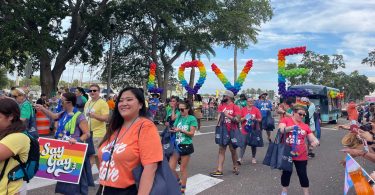Oh, to be queer in the state of Florida. Yes, that Florida. The one that any time it is mentioned online, people post the infamous GIF of Bugs Bunny sawing the state off of the United States map. Home to sunny skies and one of the world’s largest theme parks, Florida is also the site of constant legislative attacks on the numerous marginalized groups that reside here, namely its LGBTQ+ community. The state’s LGBTQ+ community continues to be the target of various bills and legislative actions that attempt to silence, discriminate against, and ridicule, despite it being a significant portion of the state’s population.
In 2024, state LGBTQ+ advocacy organizations supported Senate Bill 160 , which, if passed, would have repealed the language upholding the same-sex marriage ban by deleting the now federally unconstitutional statute from the state’s constitution. However, the bill was defeated, affirming that the conservative state actively works to devalue our hard-fought marriage rights.
…the “Don’t Say Gay” bill has been used as a template for anti-LGBTQ+ curriculum laws in other states, including Alabama, Arkansas, Indiana, Iowa, Kentucky, and North Carolina.
SB 160’s defeat comes as no surprise, as 2022’s House Bill 1557, which was widely known as the “Don’t Say Gay” bill, passed despite dissent from both Florida’s LGBTQ+ community and parents of queer youth. Officially known as the “Parental Rights in Education” bill, HB 1557 outlines sanctions on pronoun acknowledgment by school staff, provisions for book bans, and perhaps most controversial of all, fully prohibits discussion of topics on gender identity or sexual orientation in K-3 classrooms. Though these landmark anti-LGBTQ+ bills join a number of others introduced and passed in previous Florida legislative sessions, the “Don’t Say Gay” bill has been used as a template for anti-LGBTQ+ curriculum laws in other states, including Alabama, Arkansas, Indiana, Iowa, Kentucky, and North Carolina. This legislative landscape has made it not only an uphill battle to secure equitable rights, but it has also created the need for constant advocacy within the state.
As my generation has aged into adulthood, the political divisions among us and anti-queer social climate my peers have inherited from their bigoted elders, “progress” in this state has felt like a constant shuffling dance between more freedom and affirmation on the one hand and invalidation and repression on the other. Every legislator we get into office, from the community to organizations and people cultivating safe spaces and opportunities to give back to the community, is met with various attacks toward the community.
While this article could continue to harp on the negativity that has plagued Florida’s the LGBTQ+ community under Governor Ron DeSantis’ regime, I will not paint a desolate picture of the state. And, there still is hope. Through strong communal leadership, the preservation of our vibrant history, and effective advocacy for issues that concern our community, it is possible to change the overwhelmingly downtrodden narrative. Therefore, I choose to spotlight the work of the Maven Leadership Collective and The Stonewall National Museum, Archives and Library.
Maven Leadership Collective
Founded in 2016, Maven Leadership Collective is an organization that strengthens LGBTQ+ advocacy in Florida by increasing the pool of queer social justice leaders in the state. Through their various leadership cohorts, summits, masterclasses, and more, founder and creative director of the collective Corey Davis describes the organization’s work as “providing respite and fortification for people who are really on the frontlines of preserving democracy, shifting culture, and our most trusted institutions.”
Acknowledging how each of us, as a community, hold each other up against the many systems that seek to silence and oppress us is one of the main ways the collective helps to foster queer belonging in an increasingly hostile social and political environment in Florida.
I previously alluded to the way that the hostile anti-queer landscape in Florida has led to a dominant media narrative about the state, that, by extension, has contributed to a false perception about its queer community that questions our choosing to inhabit such an inhospitable space. Davis contested this, however: “The media narrative is often about ‘Why is anyone even in Florida?’ as if we should all just leave the state. What I know is that there are a lot of people dedicated to holding space for mutual aid, to making sure that information is being disseminated, to making sure that people get connected to funding because there are many ways we still have to live robust lives irrespective of what the legislature is going to do.”
Davis continues to discuss how the Maven Leadership Collective helps nurture people’s “dreams of creating just communities” by training them to take on various forms of advocacy work, including organizing, issues-based research, and providing tangible strategies to help create change. Maven empowers budding queer organizers and advocates on how to maintain their wellness as they further develop their skills and provide direct support to the communal leaders who hold down the frontlines of struggle in the fights for reproductive rights, DEI protections, minority communities, and community wellness, among other things.
“…there are many ways we still have to live robust lives irrespective of what the legislature is going to do.”
Corey Davis, Maven Leadership Collective
Organizations like the Maven Leadership Collective help cultivate the social change leaders who are at the forefront of legislative advocacy crucial to ensuring justice and access for Florida’s marginalized citizens.
Beyond this legislative advocacy work, Maven Collective trains its leaders in methods of historic preservation that provide crucial context to modern-day issues as they connect them to our ancestral struggles. This helps ensure a steady pipeline of eager, young organizers willing to get active and continue the work of those who came before. This intergenerational approach to social change work is a powerful tool that shows new organizers and the fascist state they fight that queer resistance in Florida does not just fall out of a coconut tree.
The Stonewall National Museum, Archives, and Library, like the Maven Leadership Collective, is another organization in Florida that works to remind us that we indeed exist in the liberatory context of all those who came before us.
Stonewall National Museum, Archives, and Library
Located in Fort Lauderdale, the Stonewall National Museum is dedicated to preserving Florida’s rich history of LGBTQ+ resistance. Robert Kesten, executive director of the museum, described its preservation work as a form of advocacy, “It is largely one and the same; whether we’re collecting and preserving or advocating, they all fit together extraordinarily well because you can’t advocate without having some historical perspective.”
Kesten continued: “You have to know where you’ve been to know where you are to know where you’re going.” The work of this historic museum, along with that of queer-centric digital historians, archivists, and curatorial services, is crucial advocacy work, as it circulates LGBTQ+ history on a larger scale. This work not only allows the community to gain a greater understanding of the trials that those who came before us overcame, but it also allows us to use those past experiences to inform our present strategies for resisting anti-LGBTQ+ oppression for the foreseeable future.
The museum’s robust archival database, which spans over six million pages of entries, includes the Stonewall National Museum’s digital collections and also connects visitors to outside resources that can be acquired through the museum.
Despite its significance, however, the museum has now become a victim of Florida’s $32 million legislative budget cuts to arts and cultural services and organizations. The cuts, done by DeSantis’ vetoing grant-making provisions, is a blow that Kersten said deeply impacts the state’s cultural institutions. “Although it wasn’t much money, every bit helps. So now, in Florida, we must look elsewhere for all funding.”
Kesten elaborated that despite how the museum funding loss puts them at a disadvantage, the museum and larger arts and culture community remain optimistic. “We are where the rubber hits the road; we are where the lives of people who are potentially most impacted by the government’s lack of interest in the community, and therefore, it spurs us on to do the work we do because we know that what we do makes lives better or saves lives.”
The repressive political landscape under DeSantis’ fascist leadership makes the museum’s advocacy and preservation work among the most important in the larger struggle for freedom and inclusivity. As a blueprint for crushing progress, Florida’s conservative legislative decisions have major implications for the future of the national LGBTQ+ community. This broader impact means the queer repression in our state raises the stakes of the upcoming election, as presidential and down-ballot candidates can look to our state as a precedent for potential federal repression that is a danger to all minority communities in the country.
“You have to know where you’ve been to know where you are to know where you’re going.”
Robert Kesten, The Stonewall National Museum
And yet, there is still hope. The Stonewall National Museum, Library, and Archives are not alone in their work to showcase our past, advocate for our present, and push on for a better future. The museum and the Maven Leadership Collective exist in a thriving grassroots advocacy space home to a number of organizations like Tallahassee’s Capital Tea, which counts trans femme housing support and organizes queer-centered communal events among its programs; and Out My Closet, which provides direct support to unhoused and displaced LGBTQ+ youth through their mobile pop-up clothing shops, counseling services, and educational internship programs.
In the coming months, pivotal political decisions will impact Florida’s LGBTQ+ community’s livelihood in our state and beyond. While some may not know where to turn for advocacy efforts or information regarding this election cycle’s most pressing issues, organizations like these and many others make navigating the political landscape much easier by training and supporting trusted leaders to do the work.
DeSantis’ Florida may appear to be a hostile, desolate place that persecutes all marginalized folks, but there is still hope for some type of good awaiting us—just over that seemingly distant rainbow.







